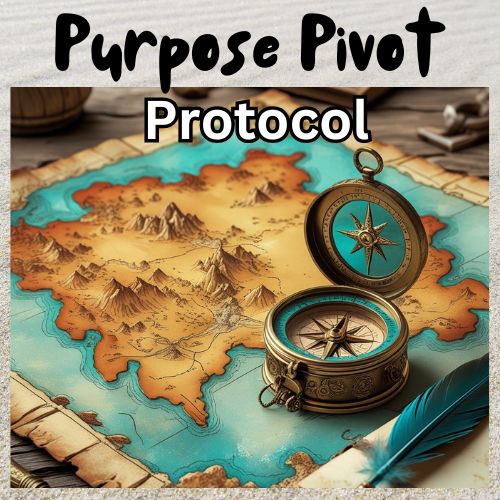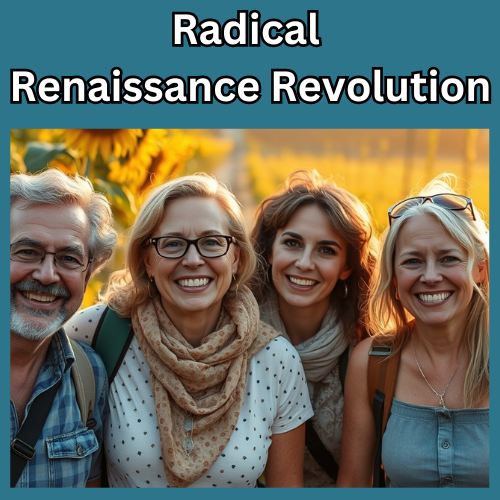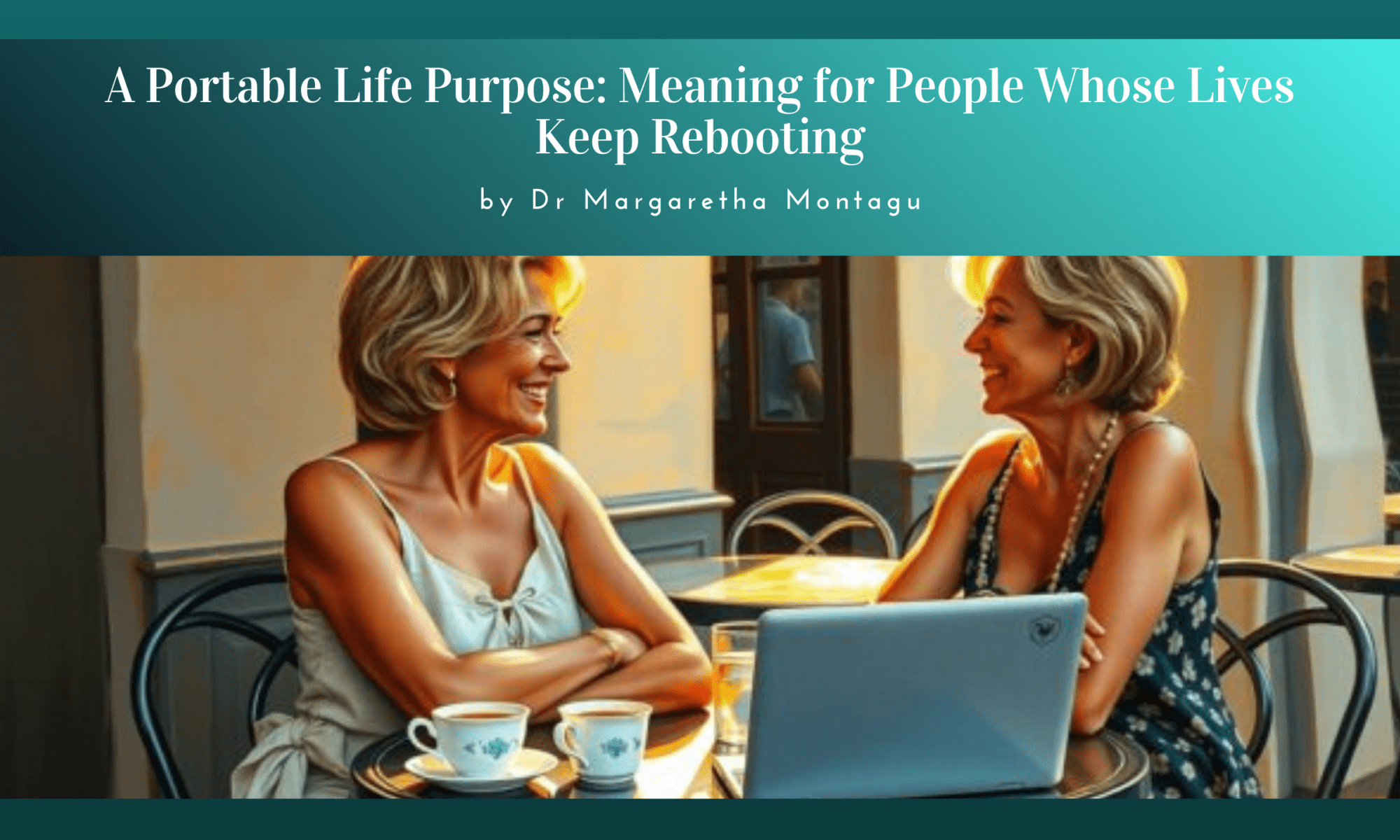Trading Possessions for Possibilities in Your Prime Years
Etienne had just sold his four-bedroom suburban home and packed his life into two suitcases, when his neighbour asked the question that haunts every aspiring nomad: “But what about your roots? Don’t you need a place to belong?”
Standing in his empty driveway, surrounded by the remnants of twenty years in one location, he realised she was asking the wrong question. The real question isn’t where you belong—it’s knowing who you are, regardless of where you are.
This is the essence of a portable purpose: the profound understanding that your meaning, mission, and identity aren’t tethered to a zip code, a mortgage, or a corner office. Instead, they travel with you, adapt with you, and often flourish most brilliantly when freed from the constraints of conventional geography.
For Baby Boomers entering retirement, Gen Xers reassessing midlife priorities, and older Millennials questioning the traditional climb up predetermined ladders, the concept of a portable purpose offers something revolutionary: the freedom to design a life that serves your values while embracing the flexibility our rapidly changing world demands.
The Geographic Trap of Traditional Purpose
Most of us have been conditioned to believe that purpose requires permanence. We’re told to plant roots, climb ladders, and build empires in specific locations. Your career anchors you to a city. Your mortgage chains you to a neighbourhood. Your social connections bind you to routines and expectations that may no longer serve who you’re becoming.
This geographic model of purpose worked well in an era of corporate loyalty and lifetime employment. But today’s reality demands something different. Remote work has untethered careers from offices. Digital connections have replaced many face-to-face relationships. The cost of living has made traditional homeownership increasingly elusive or undesirable for many.
More importantly, life stages no longer follow predictable patterns. The linear progression from education to career to retirement has been replaced by multiple reinventions, second acts, and third chapters. The person you were at 30 may bear little resemblance to who you’re becoming at 50 or who you’ll be at 70.
This evolution requires a different approach to purpose—one that’s flexible, adaptable, and inherently portable.
Inner Clarity Creates Outer Flexibility
The secret to successful nomadic living isn’t just about downsizing your possessions or mastering travel logistics. It’s about developing unshakeable inner clarity about who you are and what matters most to you. When your sense of purpose comes from within rather than from external circumstances, you gain the freedom to adapt to any environment while maintaining your authentic self.
Consider the difference between two people considering a nomadic lifestyle. The first person defines themselves by their job title, their neighbourhood status, and their accumulated possessions. The thought of leaving familiar surroundings triggers an identity crisis because their sense of self is externally constructed.
The second person has done the inner work to understand their core values, natural strengths, and intrinsic motivations. They’ve identified what brings them alive regardless of context. Their purpose isn’t tied to a particular role or location—it’s woven into their being. This person approaches nomadic life not as an escape from who they are, but as an opportunity to express who they are more fully.
The difference between these two approaches is the difference between running away and running toward something meaningful.
The Second Act Advantage
For those in their 40s, 50s, and 60s, portable purpose offers unique advantages that younger nomads don’t possess. You’ve accumulated wisdom about what works and what doesn’t. You’ve likely experienced enough of traditional life to know its limitations. You may have financial resources that provide more options than you had in your twenties.
Most importantly, you’re entering what researchers call “the second act”—a life phase characterised by the opportunity to pursue meaning over mere achievement, impact over income, and authenticity over approval.
This second act often coincides with significant life transitions: children leaving home, career peaks or plateaus, health wake-up calls, or the loss of parents. These transitions, while sometimes difficult, create natural openings for reinvention. They’re invitations to ask deeper questions: What would I do if I weren’t afraid? What legacy do I want to create? How do I want to spend my remaining decades?
The beauty of portable purpose is that it allows you to explore these questions without the constraints of your current environment. Sometimes we need physical distance from our familiar patterns to gain clarity about our deeper patterns—the ones that truly matter.
Breaking Free from the Stuff that Owns You
The journey toward portable purpose often begins with a profound realisation: most of your possessions own you more than you own them. Every item in your home represents a claim on your time, energy, and mental bandwidth. The bigger your space, the more maintenance it requires. The more things you own, the more things that can break, need organising, or demand your attention.
Downsizing isn’t just about getting rid of stuff—it’s about reclaiming your life force. Each item you release is energy you’re freeing up for more meaningful pursuits. The process of deciding what to keep and what to let go forces you to confront fundamental questions about your values and priorities.
What possessions truly serve your purpose? What items bring genuine joy or utility versus those you keep out of habit, obligation, or fear? This sorting process becomes a powerful form of life audit, revealing not just what you own, but what owns you.
Many people discover that their most treasured possessions aren’t things at all, but experiences, relationships, and memories. These intangible treasures are inherently portable—they travel with you wherever you go, growing richer with each new experience rather than becoming burdens to be maintained.
The Confidence of Reduced Dependencies
One of the most liberating aspects of developing portable purpose is the gradual reduction of dependencies on external systems and circumstances. When your happiness depends on a specific house, job, climate, or social scene, you become vulnerable to changes beyond your control. Markets crash, companies downsize, relationships end, and health challenges arise.
But when your sense of purpose and well-being comes primarily from within—from your ability to contribute, connect, and create meaning in any context—you become remarkably resilient. You develop what psychologists call “internal locus of control,” the belief that your outcomes are primarily determined by your choices and actions rather than external circumstances.
This shift in perspective transforms how you approach challenges. Instead of asking “What’s happening to me?” you begin asking “How can I respond to what’s happening?” Instead of waiting for the perfect circumstances, you start creating value with whatever circumstances you face.
This confidence compounds over time. Each successful adaptation to a new environment, each problem solved with creativity rather than resources, each meaningful connection made with strangers—all of these experiences build your trust in your ability to thrive anywhere.
A Portable Purpose as Your North Star
True portable purpose functions like a reliable compass. It doesn’t tell you exactly which path to take, but it always points you in the right direction. When you’re clear about your core values and deepest motivations, decision-making becomes simpler, even in unfamiliar environments.
Should you stay in this city another month or move on? What work opportunities align with your values? How do you want to spend your time and energy? With a clear sense of purpose, these questions have natural answers. Without it, every choice becomes overwhelming because you lack the criteria for evaluation.
This is why the inner work of clarifying your purpose must precede the outer work of lifestyle design. You can’t build a meaningful nomadic life on an unclear foundation any more than you can build a meaningful settled life without knowing what matters to you.
The process of discovering your portable purpose often involves examining your past for patterns of when you felt most alive, engaged, and effective. It requires an honest assessment of your natural strengths and how they might serve others. It demands clarity about your non-negotiable values and how they translate into daily choices.
The Ripple Effect of Authentic Living
When you align your lifestyle with your authentic purpose, something magical happens: you begin attracting circumstances, opportunities, and people that support your vision. This isn’t mystical thinking—it’s the natural result of focused intention and consistent action.
Living authentically makes you more interesting to others. It gives you stories worth telling and perspectives worth sharing. It creates natural networking opportunities because you’re genuinely engaged with activities and causes that matter to you. People are drawn to those who know who they are and what they stand for.
This magnetic quality becomes especially valuable in nomadic life, where your ability to form quick, meaningful connections can determine the quality of your experiences. When you show up as your authentic self, clear about your purpose and passionate about your path, you create space for others to do the same.
Redefining Success and Security
Traditional models of success emphasise accumulation: more money, bigger houses, higher positions, greater recognition. This accumulation model ties success to specific locations and circumstances, making it inherently non-portable.
Portable purpose requires redefining success in terms of contribution, growth, and alignment. Success becomes less about what you have and more about who you’re becoming. Security comes not from your bank balance or job title, but from your confidence in your ability to create value wherever you are.
This shift doesn’t mean becoming careless about practical matters. Nomadic life requires careful financial planning, health considerations, and logistical preparation. But these practical elements serve your purpose rather than defining it. They’re tools for living your values, not substitutes for knowing what your values are.
The Gift of Perspective
Perhaps the greatest benefit of portable purpose is the expanded perspective it provides. When you’re rooted in one location, it’s easy to mistake your local culture, economy, and social norms for universal truths. Travel—especially slow, purposeful travel—reveals the arbitrary nature of many assumptions about “how life works.”
This expanded perspective becomes a gift you can share with others. You become a bridge between different ways of thinking, living, and solving problems. Your experiences in different contexts give you insights that can help others see their own situations with fresh eyes.
For those in their second act of life, this role as cultural translator and wisdom-sharer can become a powerful source of meaning. You’re not just consuming experiences—you’re synthesising them into insights that can benefit others navigating similar transitions.
Practical Steps Towards a Portable Purpose
The journey toward portable purpose doesn’t require dramatic overnight changes. It can begin with small experiments in your current life. Try working from different locations for a week. Spend time in nature without your usual distractions. Volunteer for causes that align with your values. Take on projects that challenge you to use your strengths in new ways.
Pay attention to what energises you versus what drains you. Notice which activities make time fly and which make it crawl. Observe which conversations light you up and which leave you empty. These patterns provide clues about your authentic purpose and how it might translate into a more nomadic lifestyle.
Consider taking a sabbatical or extended retreat to gain clarity away from your usual routines. Sometimes we need physical distance from our patterns to see them clearly. A change of environment can reveal aspects of yourself that have been hidden by familiar circumstances.
Start downsizing gradually, beginning with items that hold the least emotional charge. Notice what you actually miss versus what you thought you would miss. This process builds confidence in your ability to live with less while maintaining what truly matters.
The Community of Fellow Travellers
One concern many people have about nomadic life is loneliness or loss of community. But portable purpose often leads to deeper, more authentic connections than geographical proximity alone provides. When you’re clear about your values and passionate about your path, you naturally attract others with complementary purposes.
The nomadic community is filled with individuals who’ve chosen meaning over convention, experience over accumulation, and growth over comfort. These shared values create strong bonds that often transcend the superficial connections based solely on geography or demographics.
Digital tools make it easier than ever to maintain meaningful relationships across distances while forming new ones in each location. The key is approaching connection with intention, showing up authentically, and contributing value to the communities you encounter.
How the Purpose Pursuit Protocol Guides You to Create A Portable Purpose
The Purpose Pursuit Protocol is specifically designed to help people discover and develop purpose that transcends location, circumstances, and external conditions. Here’s how the course creates truly portable purpose:
1. Values-Based Foundation Building
The protocol begins by helping participants identify their core values—the non-negotiable principles that guide their decisions regardless of where they are. Unlike external markers of success (job titles, possessions, social status), values are inherently portable. Whether you’re in a bustling city or a remote village, your values remain constant and provide consistent direction for choices and actions.
2. Strengths: Discovery and Alignment
The course guides participants through identifying their natural strengths and talents—abilities that travel with them everywhere. Rather than focusing on role-specific skills tied to particular jobs or industries, the protocol reveals transferable strengths that can create value in any context. This gives nomads confidence that they can contribute meaningfully wherever they land.
3. Internal Compass Calibration
Through structured exercises and reflection, participants develop what could be called an “internal GPS”—an intuitive sense of direction that works independently of external landmarks. This internal compass helps answer crucial nomadic questions: Which opportunities align with my purpose? How long should I stay in this location? What work should I pursue next?
4. Identity Separation from Circumstances
One of the protocol’s key breakthroughs is helping people separate their identity from their circumstances. Participants learn to distinguish between who they are (core identity and purpose) and what they do (roles, jobs, locations). This separation is crucial for nomadic life because it prevents identity crises when external circumstances change.
5. Mission Clarity Over Role Clarity
Instead of defining purpose through specific job roles or titles, the protocol helps participants articulate their broader mission in the world. A mission like “helping others transition through life changes” can be expressed through coaching, writing, speaking, mentoring, or teaching, and can be done from anywhere with internet access.
The Purpose Pursuit Protocol takes participants through a systematic transformation from externally-defined purpose to internally-generated purpose. This shift is the difference between someone who travels to escape their problems and someone who travels to express their potential.

The Purpose Pivot Protocol – drawing inspiration from the Camino de Santiago, this transformative course guides you through a proven framework to recalibrate your authentic purpose and create a meaningful and fulfilling next act. Get immediate access
Your Second/Third/Fourth Act Awaits
The traditional retirement model—working for 40 years to earn 20 years of leisure—no longer fits the reality of longer lifespans, changing economies, and evolving definitions of fulfilment. Many people in their 50s and 60s have decades of productive, meaningful life ahead of them.
Portable purpose offers a different model: continuous growth, contribution, and exploration throughout your entire lifespan. Instead of retiring from something, you’re advancing toward something. Instead of winding down, you’re opening up to new possibilities.
This approach requires courage—the courage to question conventional wisdom, to trust your inner compass, and to bet on your ability to adapt and thrive in new environments. But for those willing to do the inner work of clarifying their purpose, the rewards are extraordinary: a life of freedom, meaning, and continuous growth.
The question isn’t whether you’re too old to start over or too set in your ways to change. The question is whether you’re ready to design a life that honours who you’re becoming rather than just who you’ve been.
Your purpose is portable because it lives within you. Your life can be intensely meaningful because you have the wisdom, resources, and freedom to create it.
The only requirement is the courage to begin.

Ready to start again, stronger than ever before? This quiz will help you find out. It is not just about measuring where you are right now; it’s about shining a light on the areas of your life that feel meaningful, as well as those that might need attention. It’s an opportunity to reflect, recalibrate, and take steps toward a life that’s not only successful but profoundly fulfilling. Take The Quiz

“I am an experienced medical doctor – MBChB, MRCGP, NLP master pract cert, Transformational Life Coach (dip.) Life Story Coach (cert.) Stress Counselling (cert.) Med Hypnotherapy (dip.) and EAGALA (cert.) I may have an impressive number of letters after my name, and more than three decades of professional experience, but what qualifies me to excel at what I do is my intuitive understanding of my clients’ difficulties and my extensive personal experience of managing major life changes using strategies I developed over many years.” Dr M Montagu

